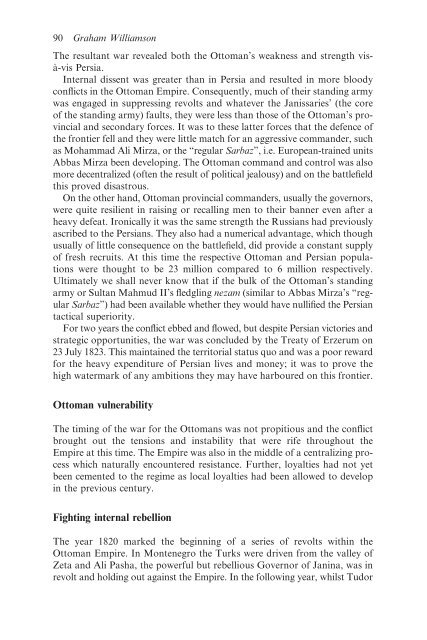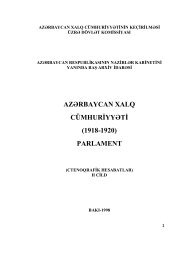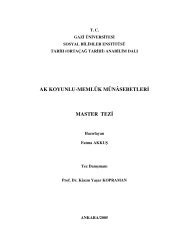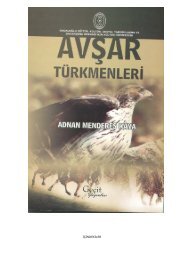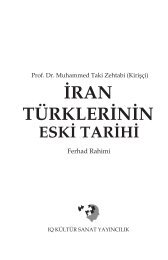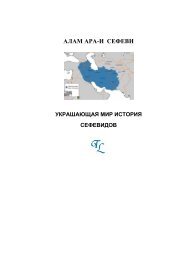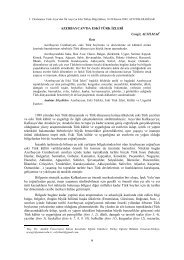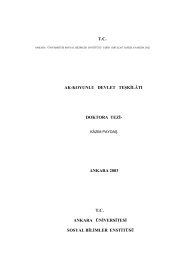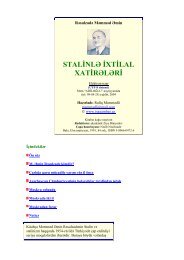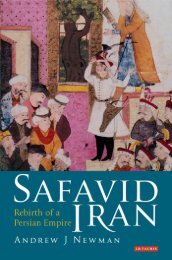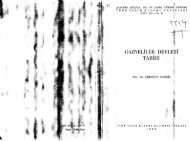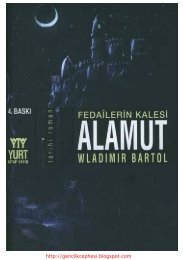War and Peace in Qajar Persia: Implications Past and ... - Oguzlar.az
War and Peace in Qajar Persia: Implications Past and ... - Oguzlar.az
War and Peace in Qajar Persia: Implications Past and ... - Oguzlar.az
- No tags were found...
Create successful ePaper yourself
Turn your PDF publications into a flip-book with our unique Google optimized e-Paper software.
90 Graham WilliamsonThe resultant war revealed both the Ottoman’s weakness <strong>and</strong> strength visà-vis<strong>Persia</strong>.Internal dissent was greater than <strong>in</strong> <strong>Persia</strong> <strong>and</strong> resulted <strong>in</strong> more bloodyconflicts <strong>in</strong> the Ottoman Empire. Consequently, much of their st<strong>and</strong><strong>in</strong>g armywas engaged <strong>in</strong> suppress<strong>in</strong>g revolts <strong>and</strong> whatever the Janissaries’ (the coreof the st<strong>and</strong><strong>in</strong>g army) faults, they were less than those of the Ottoman’s prov<strong>in</strong>cial<strong>and</strong> secondary forces. It was to these latter forces that the defence ofthe frontier fell <strong>and</strong> they were little match for an aggressive comm<strong>and</strong>er, suchas Mohammad Ali Mirza, or the “regular Sarb<strong>az</strong>”, i.e. European-tra<strong>in</strong>ed unitsAbbas Mirza been develop<strong>in</strong>g. The Ottoman comm<strong>and</strong> <strong>and</strong> control was alsomore decentralized (often the result of political jealousy) <strong>and</strong> on the battlefieldthis proved disastrous.On the other h<strong>and</strong>, Ottoman prov<strong>in</strong>cial comm<strong>and</strong>ers, usually the governors,were quite resilient <strong>in</strong> rais<strong>in</strong>g or recall<strong>in</strong>g men to their banner even after aheavy defeat. Ironically it was the same strength the Russians had previouslyascribed to the <strong>Persia</strong>ns. They also had a numerical advantage, which thoughusually of little consequence on the battlefield, did provide a constant supplyof fresh recruits. At this time the respective Ottoman <strong>and</strong> <strong>Persia</strong>n populationswere thought to be 23 million compared to 6 million respectively.Ultimately we shall never know that if the bulk of the Ottoman’s st<strong>and</strong><strong>in</strong>garmy or Sultan Mahmud II’s fledgl<strong>in</strong>g nezam (similar to Abbas Mirza’s “regularSarb<strong>az</strong>”) had been available whether they would have nullified the <strong>Persia</strong>ntactical superiority.For two years the conflict ebbed <strong>and</strong> flowed, but despite <strong>Persia</strong>n victories <strong>and</strong>strategic opportunities, the war was concluded by the Treaty of Erzerum on23 July 1823. This ma<strong>in</strong>ta<strong>in</strong>ed the territorial status quo <strong>and</strong> was a poor rewardfor the heavy expenditure of <strong>Persia</strong>n lives <strong>and</strong> money; it was to prove thehigh watermark of any ambitions they may have harboured on this frontier.Ottoman vulnerabilityThe tim<strong>in</strong>g of the war for the Ottomans was not propitious <strong>and</strong> the conflictbrought out the tensions <strong>and</strong> <strong>in</strong>stability that were rife throughout theEmpire at this time. The Empire was also <strong>in</strong> the middle of a centraliz<strong>in</strong>g processwhich naturally encountered resistance. Further, loyalties had not yetbeen cemented to the regime as local loyalties had been allowed to develop<strong>in</strong> the previous century.Fight<strong>in</strong>g <strong>in</strong>ternal rebellionThe year 1820 marked the beg<strong>in</strong>n<strong>in</strong>g of a series of revolts with<strong>in</strong> theOttoman Empire. In Montenegro the Turks were driven from the valley ofZeta <strong>and</strong> Ali Pasha, the powerful but rebellious Governor of Jan<strong>in</strong>a, was <strong>in</strong>revolt <strong>and</strong> hold<strong>in</strong>g out aga<strong>in</strong>st the Empire. In the follow<strong>in</strong>g year, whilst Tudor


